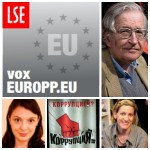London Scool of Economics turns on to Audio
London Scool of Economics turns on to Audio
 About the author: Cheryl Brumley is Multimedia Editor of the LSE Review of Books. Cheryl joined the PPG in January 2012 after graduating from the LSE with an MSc in Theory and History of IR. Cheryl previously conducted research into social media and the Arab Spring at the Regional Centre for Conflict Prevention in Jordan, and researched for BBC World Service radio on work experience.
About the author: Cheryl Brumley is Multimedia Editor of the LSE Review of Books. Cheryl joined the PPG in January 2012 after graduating from the LSE with an MSc in Theory and History of IR. Cheryl previously conducted research into social media and the Arab Spring at the Regional Centre for Conflict Prevention in Jordan, and researched for BBC World Service radio on work experience.
In his book The Third Ear, German music journalist and jazz producer Joachim-Ernst Berendt writes that we must aspire to ‘a democracy of the senses’. In Berendt’s opinion our ears should serve a primary guide, in spite of our visually obsessed modern age.
Although we didn’t explicitly take on the lofty task of supplanting the visual with the aural, the LSE Review of Books Podcast did set out to challenge the idea that an academic podcast was simply a speaker in front of a microphone. Sound in its many forms can be used to enrich the listener’s understanding of a subject, in our case the various facets of the social sciences, by incorporating techniques and formats from radio broadcasting.
 Since May 2011, the LSE Review of Books has created six, bi-monthly podcasts all featuring three interviews with notable authors and academics. We have covered wide-ranging topics: linguistics, feminism, Marxism, urban planning and the Olympics, democratisation, and China’s global diaspora. The podcasts grew out of the success of the LSE’s THE (Times Higher Education) Award-winning Public Policy Group (PPG) blogs. The main aim of the podcasts sits closely alongside those of the LSE Review of Books and the PPG’s three other blogs: to encourage public engagement with, and understanding of, the social sciences. Funded by the Higher Education Innovation Fund (HEIF 5), the podcasts are part of our goals of innovation and knowledge exchange between experts within and outside universities, and to open up academic research so as to increase its impact.
Since May 2011, the LSE Review of Books has created six, bi-monthly podcasts all featuring three interviews with notable authors and academics. We have covered wide-ranging topics: linguistics, feminism, Marxism, urban planning and the Olympics, democratisation, and China’s global diaspora. The podcasts grew out of the success of the LSE’s THE (Times Higher Education) Award-winning Public Policy Group (PPG) blogs. The main aim of the podcasts sits closely alongside those of the LSE Review of Books and the PPG’s three other blogs: to encourage public engagement with, and understanding of, the social sciences. Funded by the Higher Education Innovation Fund (HEIF 5), the podcasts are part of our goals of innovation and knowledge exchange between experts within and outside universities, and to open up academic research so as to increase its impact.
I find the ‘magazine-style’ format of our podcasts allows for a more dynamic and profound portrait to emerge from beneath intimidating academic subjects. For instance, in our first episode on linguistics we uncovered the curiosities of an Amazonian language with Professor Dan Everett, and we also heard from poet Philip Gross about the effects of father’s degenerative speech disorder, a devastating development in the life of a once-gifted polyglot. The range of angles covered around any one theme makes for a rewarding planning process – one that challenges us to wed different academic or other specialists to one another, and which produces a sum greater than its parts.
… the main aim of the podcasts is to encourage public engagement with, and understanding of, the social sciences
Textured wildtrack, and lively stings, plays an integral role in each podcast. In our fourth episode, pegged to the London Olympics, we had the fortune of speaking to author Iain Sinclair as we walked through Hackney’s London Fields, towards the nearby Regent’s Canal. As we moved from the Fields to Broadway Market, Iain started to address the lightning forge of changes to East London, until he was cut off by the pulsating noise of a jackhammer, and the harsh interjection of motor-saws, from neighbouring construction sites. The parallels between the soundscape and the content of the interview, though never referenced explicitly, made for a richer experience and contextualised Iain’s arguments about imposed urban planning.

 Learning on Screen
Learning on Screen